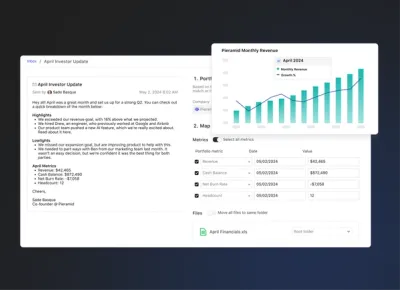
Building a startup is difficult. For most founders, it is their first time starting and building a business. However, there is not academy or university a first-time founder can lean on the learn the ways.
The best way to learn as a founder is by doing. But founders need to turn to their peers, investors, stakeholders, and resources along the way to help hone their skills and build their company.
Related Resource: Business Startup Advice: 15 Helpful Tips for Startup Growth

Learn more about the best startup resources for founders below:
What are startup resources?
As we mentioned earlier, building a startup is difficult. Leveraging the existing resources around is a surefire way to hone your founder skills on the fly. Instead of having to build and learn things in-house, founders can lean on the apps, leaders, and tools around them to build their businesses.
Related Resource: Top SaaS Products for Startups
Learn about the resources and tools available to startup founders below:
1. Accounting and finance
At the core of any business are the financials and data surrounding it. To help with accounting and finance, founders can lean on different software to help automate and improve accounting efforts.
In addition to software and tools, there are countless accounting and finance firms geared specifically towards startups. Learn more about popular startup accounting firms below:
Related Resource: A User-Friendly Guide to Startup Accounting
Accounting software
Chances are, most founders do not have the skill set to maintain their startup books. In addition to the skill, it is also time-consuming. Thankfully, there are countless accounting tools that startups can use to stay on top of their financials. Check out a few popular accounting software options below:
Invoicing software
Like accounting, invoicing is a critical part of startup financials. Leveraging software to collect invoices is a surefire way for everyone involved to save time. As most startups use invoicing software, the options are generally robust and can handle any customizations for your business. Check out a few popular options below:
Related Resource: Important Startup Financials to Win Investors
2. Domain and website tools
For most modern-day startups, a website is table stakes. As more commerce takes place online, having a modern website can separate you from the field. Of course, most founders don’t have the domain and website knowledge to build a website from scratch. However, there are hundreds of tools to help founders manage their domain and build a website with limited design and coding knowledge. Check out a few of the most popular website tools below:
Related resource: 20 Best SaaS Tools for Startups
3. Marketing and content management
Going hand in hand with a modern website is a modern approach to marketing. Currently, most startups are running some form of content and marketing playbook – no matter how big or small. For most startups, this looks like regular email communication, occasional blogs, and a presence on social media.
In order to help teams stay on top of their content and marketing efforts, there are hundreds of dedicated tools. Learn more below:
Analytics software
As the old saying goes, “you can’t improve what you don’t measure.” As a baseline, startups that are investing in content should have some analytics in place to properly measure what is working. Most of these tools can be implemented with limited tech expertise and can be built out as your company scales. Check out a few popular analytics tools below:
Customer relationship management (CRM) software
Another tool that most founders should invest in is a customer relationship management (CRM) tool. CRMs are the lifeblood of productive sales and marketing teams and allow everyone to track conversations and pipeline data.
CRMs come in all shapes and sizes. Some are dedicated to specific use cases while others cover everything from manual data entry to robust integrations and add-ons. Learn more about a few of the most popular CRMs below:
Email marketing
As we previously mentioned, email marketing has become an important aspect of how startups market and communicate with their customers. There are hundreds of email marketing tools that founders can leverage to build out their email marketing efforts. Check out a few of the popular email marketing tools below:
Social media management
At this point, it is expected that every business will have some sort of presence on social media. As the platforms continue to grow (Twitter, Instagram, Facebook, Tik Tok, etc.) staying on top of all of them can be a hassle. In order to help marketers stay on top of their social media efforts, there are countless tools to help. Check out a few of the most popular tools below:
4. Project management
One of the differentiators of a startup is the fact that the team can iterate and move quickly. Whereas larger corporations have thousands of employees and guidelines, building products or new acquisition strategies can come with long delays. On the flip side, startups generally have smaller teams and the ability to push a new product or test new acquisition efforts overnight.
In order to stay on top of these efforts, startups should consider implementing a project management tool to stay on top of their day-to-day projects. This can mean everything from bug fixes in products to full-fledged marketing campaigns. Check out a few of the most popular project management tools below:
5. Human resources management
As startups grow, having the resources in place for employees is vital. Most startups don’t bring on a dedicated human resource manager until later in their company lifecycle. To save time and to make sure you are offering the resources your teammates need, consider a management tool to help. Check out a few of the most popular human resource management tools below:
6. Legal help
Over the course of starting and building a business, founders will face legal aspects. Chances are most founders don’t have the legal chops to get through the basic practices needed throughout their businesses lifecycle it is important to have help with legal. This can come in the form of bringing on an outside law firm or leveraging tools and software to help with the legal aspects that come with building a business.
7. Investor relationship management
For startups that have raised venture capital, having a plan in place to communicate and leverage their investors is a must. At Visible, we have found companies that regularly communicate with their investors are 300% more likely to raise follow on funding.
Raising venture capital is a relationship-based game. In order to best your chances of raising capital, you need to build relationships and trust with potential investors. Chances are that potential investors will turn to your current investors for due diligence so it is important they give a glowing review.
Additionally, investors can be a wealth of knowledge when it comes to hiring, strategy, and building product. Learn more below:
Related Resource: The Complete Guide to Investor Reporting and Updates
Related Resource: Top VCs Investing in the $100 Billion Creator Economy
Related Resource: Advisory Shares Explained: Empowering Entrepreneurs and Investors
Fund your startup with Visible

Raising capital for your business is another skill founders need to hone. There are countless resources and tools to help founders raise capital too.
Related Resources:
- All-Encompassing Startup Fundraising Guide
- Business Venture vs Startup: Key Similarities and Differences
Find investors for your business, track your fundraising, share your pitch deck, and update investors all from one platform. Give Visible a free try for 14 days here.




